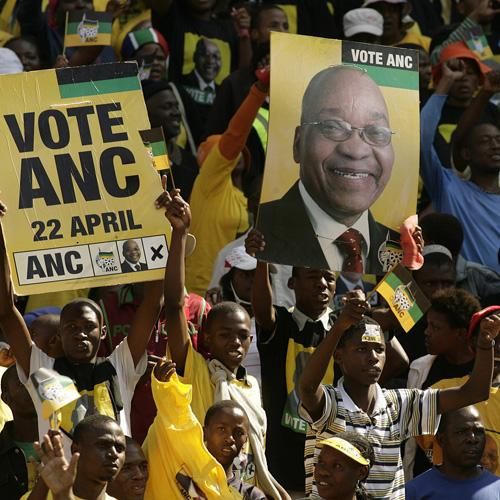JOHANNESBURG - South Africans vote on Wednesday in the closest election since the end of apartheid with the ruling African National Congress' huge majority likely to be cut by a revitalised opposition.
ANC leader Jacob Zuma will become South Africa's fourth democratic president but will have his work cut out to assure investors his government will stick to policies which created the country's longest period of economic growth.
More than 23 million voters are registered to cast their ballots on Wednesday in national and provincial elections in Africa's biggest economy.
Analysts say the ANC's 70 per cent majority may be reduced to between 60 and 65 per cent - removing the ability to change the constitution at will with a two-thirds parliamentary majority.
"It looks to me like a close-run thing. A slightly more market-positive story would be that the ANC falls below the two-thirds majority," said Mike Davies, Middle East and Africa analyst at Eurasia Group.
"It still seems the more likely outcome that the ANC will lose a degree of support that it won in 2004. I would see the ANC falling slightly below the two-thirds majority".
The official opposition Democratic Alliance, resurgent under new leader Helen Zille, and the new Congress of the People (COPE) - formed by dissident ANC leaders - are likely to take votes from the ruling party.
The DA is seen winning up to 15 per cent of votes and although COPE's challenge has weakened since it was launched in December, the party is still expected to take up to 10 percent of the vote.
"COPE has faded badly from the earlier promise ... they failed because of very poor organisation, lack of money, but most of all because of the leadership conflict which they sought to solve insanely by plucking an unknown figure out of the blue and making him a presidential candidate," said veteran political analyst Allister Sparks.
COPE's candidate for president, Mvume Dandala, is a Methodist bishop who was chosen after a disagreement over leadership between the new party's co-founders, former defence minister Mosiuoa Lekota and Mbhazima Shilowa, former premier of Gauteng province.
NO MOVE TO THE LEFT
The ANC, which has ruled South Africa since 1994, will still dominate parliament and analysts do not expect a sudden shift to the left to reward trade unions and the South African Communist Party for their support of Zuma.
"We do not expect a sudden lurch to the left in policy as the ANC will likely be constrained by a smaller majority in the National Assembly and the discipline required to keep investors onside," Nomura analysts Peter Attard Montalto and Alastair Newton said in a report.
A new Zuma government not only needs to assure investors. It has to address a myriad of problems at home.
Millions of blacks still live in impoverished shantytowns, unemployment is around 30 per cent and the country has one of the highest rates of violent crime in the world. About 1,000 people die every day from illnesses related to AIDS.
Zuma said in an interview with Reuters last month that poverty is a major problem with statistics showing the number of poor had increased since 1994.
"It is a question of emerging with realistic policies that must address the plight of the country, particularly the poor," he said.
South Africa is heading towards its first recession in 17 years as second round effects from the crisis make their impact, with unions fearing more job losses in the manufacturing and automobile industries.
Sparks said questions over the new government's policies and priorities will be overshadowed by the global financial crisis.
"Whatever political ideas Zuma may have in mind, if any, he is going to be constrained by the realities of the global economic crisis ... Economic survival will be the watchword".
South Africa's ANC majority under threat in poll
South Africa's ANC majority under threat in poll













